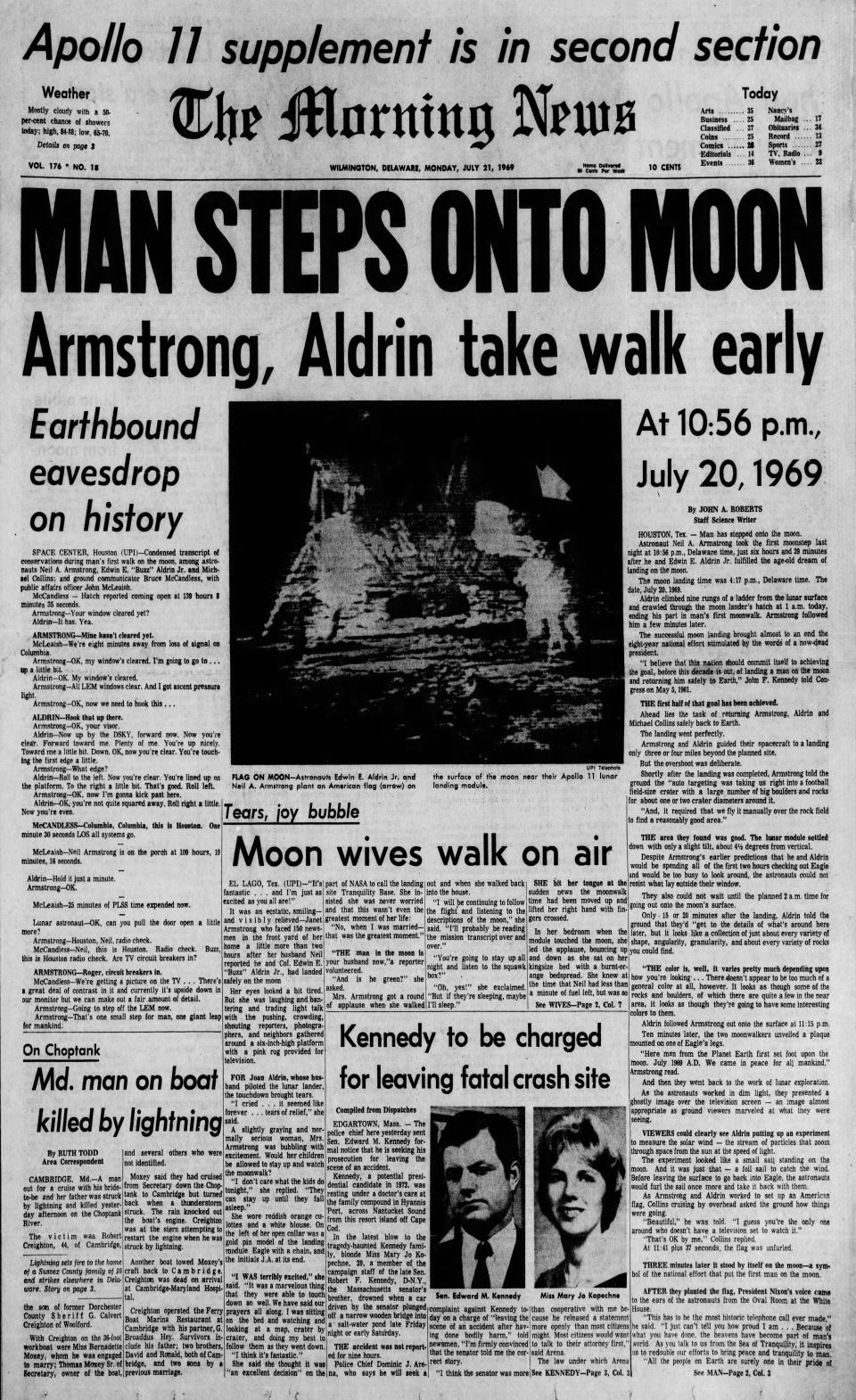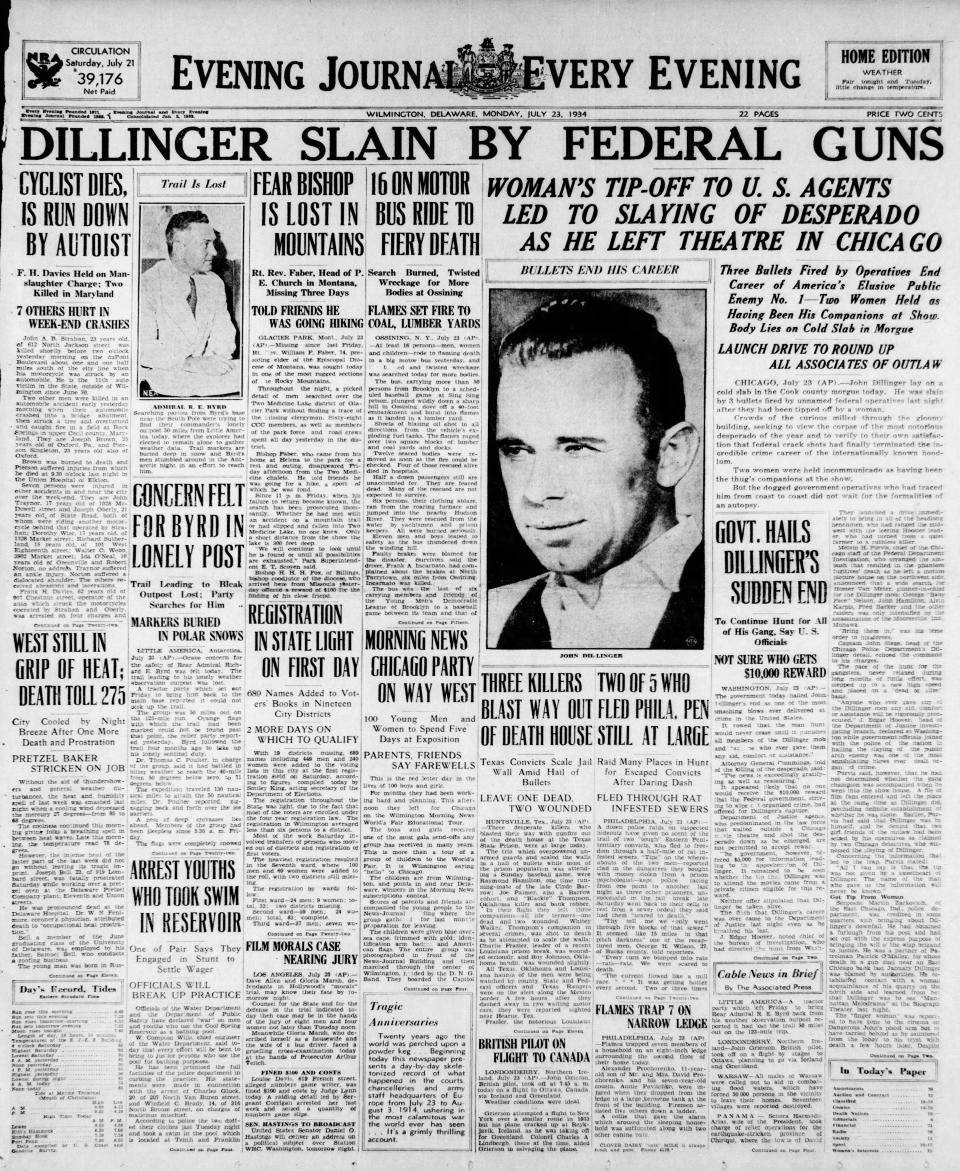Pages of history: Moonwalk, Dillinger and more from News Journal archives, week of July 17
- Oops!Something went wrong.Please try again later.
"Pages of history" features excerpts from The News Journal archives including The Morning News, the Wilmington Morning News and The Evening Journal.
July 17, 1922, The Evening Journal
Government to force peace in coal mines
President Harding today proposed federal arbitration of the nationwide mine strike.
Speaking before the conference of miners and operators at the White House, the executive suggested that the dispute be submitted to a federal commission composed of three operators, three miners and five persons to represent the public….
Harding also again demanded that the operators and miners resume mining operations pending the findings of the commission. This commission would have until Aug. 10 to arrange a new wage scale according to the Harding plan. In the meantime the old wage scale would be effective and the men would immediately return to work….
The president and his observers at the conference, Secretaries Hoover and Davis, are now practically prepared to meet the threatening fuel shortage, steadily approaching the danger point. With consumption at normal and production at approximately 50% of normal, reserve stocks are low and rapidly dwindling….
Troops prepare to protect mail trains during railroad strike
Unless the government takes immediate steps to protect mail trains of the Wabash Railroad in Missouri, service will have to be discontinued, J.E. Taussig, president of the railroad, wired to the post office department today….
Railway strikers have seriously hampered the operation of trains, he stated.
“At Moberly, Missouri Saturday night, strikers from our division shops attacked a mail train enroute from Kansas City to Detroit,” he declared. “They cut the air hose and threw bricks through the car windows. Eighteen of our employees…were forcibly taken off the train and brought to a labor hall.”
Troops of five states – Indiana, Missouri, Kansas, Mississippi and California – were mobilized, ready for instant service to prevent outbreaks between pickets and strikebreakers. Federal marshals were on duty at Slater, Missouri and Aurora, Illinois, and federal officials were prepared to order U.S. government troops into those two districts in case the marshals were unable to control the situation….
Recent railroad news:‘Faulty assumptions’ led to Amtrak’s $41 million purchase of Wilmington building
July 18, 1996, The News Journal
Plane explodes off Long Island
A TWA jetliner with 229 people aboard exploded in a fireball shortly after taking off for Paris and plunged into the waters off Long Island Wednesday night. There were no signs of survivors.
The 747 jet, Flight 800, was bound for Charles de Gaulle Airport from Kennedy Airport when it went into the Atlantic Ocean 20 miles off Moriches Inlet at about 8:45 p.m.

There are 212 passengers and 17 crew members on the jet, according to Mike Kelly, a TWA vice president. He said the plane had arrived from Athens, Greece, and had been on the ground about three hours before taking off for Paris. Some of the passengers were from an earlier canceled flight to Rome.
Asked about the possibility of a bomb, Federal Aviation Administration spokesman Eliot Brenner said, “We can’t discuss security issues.”
ABC News reported the FAA received no distress call from the pilot before the crash, suggesting there was no warning of any problem….
July 21, 1969, The Morning News
Man steps onto moon; Armstrong, Aldrin take walk early
Man has stepped onto the moon.
Astronaut Neil A. Armstrong took the first moonstep last night at 10:56 p.m., Delaware time, just six hours and 39 minutes after he and Edwin E. Aldrin Jr. fulfilled the age-old dream of landing on the moon.
The moon landing was at 4:17 p.m., Delaware time. The date, July 20, 1969….

The successful moon landing brought almost to an end the eight-year national effort stimulated by the words of a president, now deceased.
“I believe that this nation should commit itself to achieving the goal, before this decade is out, of landing a man on the moon and returning him safely to Earth,” John F. Kennedy told Congress on May 5, 1961.
The first half of the goal has been achieved.
Ahead lies the task of returning Armstrong, Aldrin and Michael Collins safely back to Earth….
Catch up on history:News Journal archives, week of May 22
July 23, 1934, Evening Journal/Every Evening
Dillinger slain by federal guns
John Dillinger lay on a cold slab in the Cook County morgue today. He was slain by 3 bullets fired by unnamed federal operatives last night in Chicago after they had been tipped off by a woman.
Crowds of the curious milled through the gloomy building, seeking to view the corpse of the most notorious desperado of the year….

For the stakeout at the Biograph Theatre, Melvin H. Purvis, chief of the Chicago Bureau of the Department of Justice, selected 15 crack shots – by a grim coincidence, one for each victim of murders attributed to the Dillinger marauders….
The total loot taken by Dillinger in his short, sensational life of crime was nearly a quarter of a million dollars.
Most of his depredations were directed against banks in his home state of Indiana. The largest single “haul” was $144,000 taken in the robbery of a Greencastle, Ind. bank.
The loot in other robberies ranged from $3,000 to $28,000. Illinois and Wisconsin were the only states other than Indiana to suffer from his holdups, so far as records show….
Reach reporter Ben Mace at rmace@gannett.com.
This article originally appeared on Delaware News Journal: News Journal archives with plane explosion, Armstrong walks on moon

